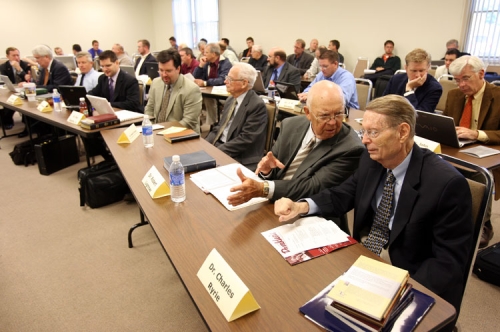 I have been mulling over the various viewpoints of the new covenant within dispensationalism since the discussion of that topic at last September’s Council on Dispensational Hermeneutics. In a previous post, I had suggested three viewpoints. I left out the viewpoint of two new covenants (one for Israel and a separate one for the Church) since no one at the Council voiced that opinion. However, if I were to include that view within the various options, I came up with this outline as one of many possible outlines for discussing the options:
I have been mulling over the various viewpoints of the new covenant within dispensationalism since the discussion of that topic at last September’s Council on Dispensational Hermeneutics. In a previous post, I had suggested three viewpoints. I left out the viewpoint of two new covenants (one for Israel and a separate one for the Church) since no one at the Council voiced that opinion. However, if I were to include that view within the various options, I came up with this outline as one of many possible outlines for discussing the options:
Dispensational Views on the Interpretation of the New Covenant
1. The Church has no relationship to Israel’s new covenant
(1a) Only one new covenant for Israel which is to be ratified and begin fulfillment at the start of the millennium
(1b) Two new covenants — the Church has its own covenant without having a relationship to Israel’s covenant.
2. The Church has a relationship to Israel’s new covenant
(2a) Indirect — not as legal participants but receiving blessings due to union with Christ
(2b) Direct — as legal participants in the new covenant promised to Israel as God expands his promise
I would not mind some feedback on this outline. Also, I would like to know if there are any dispensational scholars who hold to two new covenants.

#1 by Dave James on February 24, 2010 - 3:47 PM
Quote
Mike,
This seems like a good outline.
I was wondering if “legal participants” is the best term if we’re distinguishing Israel from Christians as participants. I haven’t thought of a better term, yet.
I recently created a PPT slide that diagrams the relationships of the Abrahamic, Davidic and New Covenants – and trace the 3 aspects (land, seed, blessing) of the Abrahamic covenant forward – where seed and blessing are repeated/confirmed in the Davidic Covenant, land and blessing are repeated/confirmed in the New Covenant – with the blessing aspect including / extending to the spiritual descendants of Abraham (i.e., the church).
I plan on posting it to the ABI website for reference / comment.
Dave James
The Alliance for Biblical Integrity
http://www.biblicalintegrity.org
#2 by Mike Stallard on February 24, 2010 - 3:52 PM
Quote
Dave,
Yes, how we describe these things is a knotty issue perhaps. So far I have been using “legal” as a term to show that the issue is whether participants are formally related as legal partners to the covenant. We need to keep working on terminology.
Mike S
#3 by Dave Fredrickson on April 26, 2010 - 5:30 PM
Quote
Mike,
Do you know of any TD’s who hold to 2b) as written, or is that view as written the provice of PD?
Dave F
#4 by Mike Stallard on May 5, 2010 - 8:54 PM
Quote
Dave,
There are many TDs who hold to 2b. Rod Decker argued for that view at the Council last September based upon the teachings of Hebrews 7-10. I have never seen this particular position as a watershed of any kind that separates PD from other dispensationalists.
Mike S
#5 by David Roseland on August 31, 2010 - 11:56 AM
Quote
Dear Dr. Stallard,
Thank you for your work with the CDH. Last year’s conference was very illuminating. What a terrific ministry for BBS and the Church of our Lord.
I have just noticed this blog and want to mention the worthy Dr. Eugene Merrill at DTS. I believe he still holds to the 2 New Covenant position of Chafer. A friend of mine who took a course with him found his argument very convincing. I did not hear it myself.
Looking forward to 2010 CDH.
In His Grace,
David Roseland
Preston City Bible Church
#6 by Jerry Shugart on October 14, 2010 - 1:45 PM
Quote
One of the papers presented at the 2009 Council was by John Master, and he made a very important observation about the text in the OT which relates to the New Covenant:
“The context of the text relates to corporate Israel and not simply to individuals per se. It is dealing with national transformation not simply individual regeneration”[emphasis added] (John Master, New Covenant Considerations, Sept., 2009; Presented at the 2009 Council on Dispensational Hermeneutics).
This is a fact that most people overlook. Individual Jews were being saved and having their sins forgiven before the Cross (Luke 7:48-50) even though it was to be the New Covenant promised to Israel which was to provide for a “forgiveness of sins” (Jer.31:34).
Since individuals were receiving the forgiveness of sins prior to the ratification of the New Covenant it is obvious that the New Covenant applied to corporate Israel.